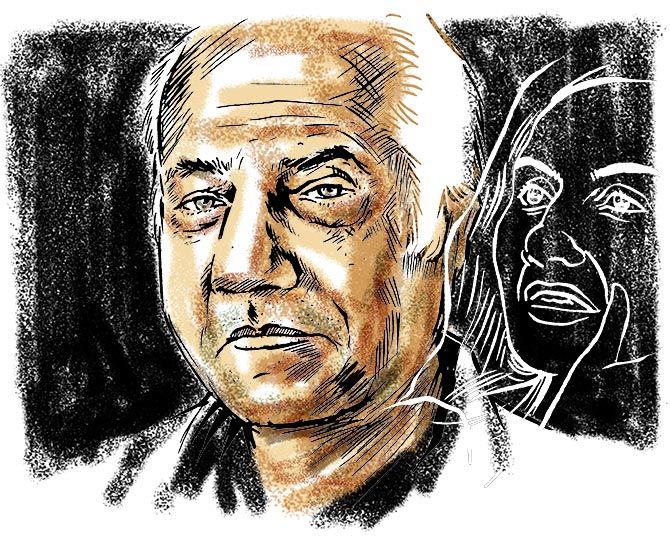'It's still very early. I have just been handed over the matter and therefore I haven't formed any views on it as yet,' Justice B N Srikrishna tells Pavan Lall.
Illustration: Dominic Xavier/Rediff.com

Once again, Bellur Narayanaswamy Srikrishna, the 77-year-old retired judge who hails from Matunga in Mumbai, will have the arc lights on him.
That's because his latest assignment involves being an independent investigator for the ongoing allegations of financial impropriety against ICICI Bank's boss Chanda Kochhar.
She faces charges of colluding with industrialists to engage in quid pro quo relationships that involved her husband Deepak Kochhar.
Asked what he makes prima facie of the ICICI-Kochhar issue so far, Justice Srikrishna says, "It's still very early as I have just been handed over the matter and therefore I haven't formed any views on it as yet."
Justice Srikrishna adds that the committee on data protection and privacy framework, which he is heading, will complete its mandate in a week or two, after which he will take up the ICICI matter.
The outcome of the data protection matter could have a huge impact on citizens' privacy, on firms such as Facebook as well as Google and how they do business in India.
Why is he taking on the ICICI Bank-Kochhar issue?
Justice Srikrishna says he is driven by any problem that is put up in front of him and that he is willing to take on anything that makes sense to him.
Despite the professed detachment to work that comes his way, Justice Srikrishna acknowledged that the ICICI Bank issue is "significantly important", but declined to speculate on how long the inquiry would take to complete.
"Your guess is as good as mine," is the retort from the straight-talking former Supreme Court judge, who other lawyers accurately describe as "salt of the earth."
Justice Srikrishna, who hails from a Kannadiga family, is a second generation lawyer.
Before starting out predominantly as a labour litigation lawyer in the Bombay high court, he built on his legacy.
That was followed by his elevation in 1991 as a judge in the Bombay high court when he retained his residence in Matunga, north central Mumbai, opting not to shift to official residences reserved for judges in south Mumbai.
Even as Justice Srikrishna's ICICI-related appointment was closely guarded until recently, it doesn't come as a surprise.
Nikhil Sakhardande, a Mumbai-based lawyer, who knows Justice Srikrishna, says, "He is grounded, astute and everyone has only good things to say about him."
His popularity aside, a lawyer specialising in corporate law said one of the key reasons for his selection is because his position as chairman of the Financial Sector Legislative Reform Committee in 2013.
The FSLRC had suggested a major overhaul in the finance sector's regulatory architecture that included establishing an Indian Financial Code to replace most existing laws.
It also called for creating one regulator for equity, pension, insurance and commodities markets. It suggested reviewing the Reserve Bank of India's regulatory structure.
In 2017, Justice Srikrishna led a 10-member committee which submitted recommendations to the Union law ministry calling for promoting institutional arbitration for both domestic and international cases.
This was suggested for speedy resolution of commercial disputes and to make India an international hub for arbitration.
Justice Srikrishna has to his credit key path-breaking judgments that involved the double taxation Mauritius treaty and the 1991 case of Minoo Balsara vs The Union of India and others on the matter of residents of government premises enjoying the protection of rent control Acts.
It also included a judgment against Maharashtra's then urban development minister Manohar Joshi for illegal construction that his son-in-law undertook in Pune.
There have also been several committees on hot-button issues of national significance that he steered.
An investigative commission formed under Justice Srikrishna oversaw an inquiry into the Bombay riots which saw large-scale unrest in late 1992 and early 1993 between Hindus and Muslims as a result of demolition of the Babri Masjid in Ayodhya.
However, the recommendations of the inquiry were not enacted.
Later in 2010, the committee for consultations headed by Justice Srikrishna assessed the demand for a separate state of Telangana.
As a linguist who is conversant with Tamil, Sanskrit, Malayalam, Telugu, Marathi and his mother tongue Kannada, Justice Srikrishna is also familiar with Bengali.
"How many languages you speak doesn't really matter. What is important is that what you say is understood," Justice Srikrishna quips.












 © 2025
© 2025